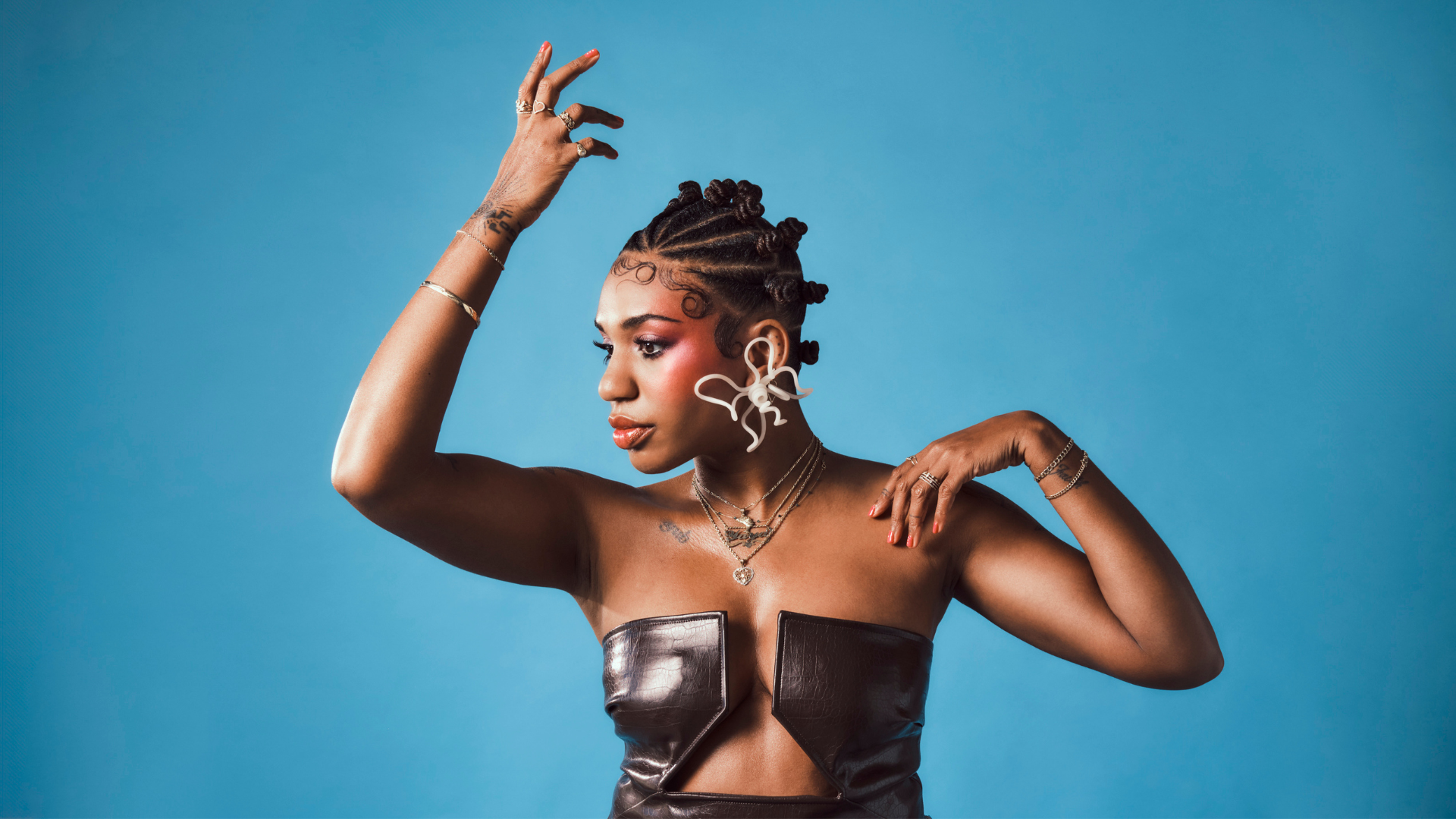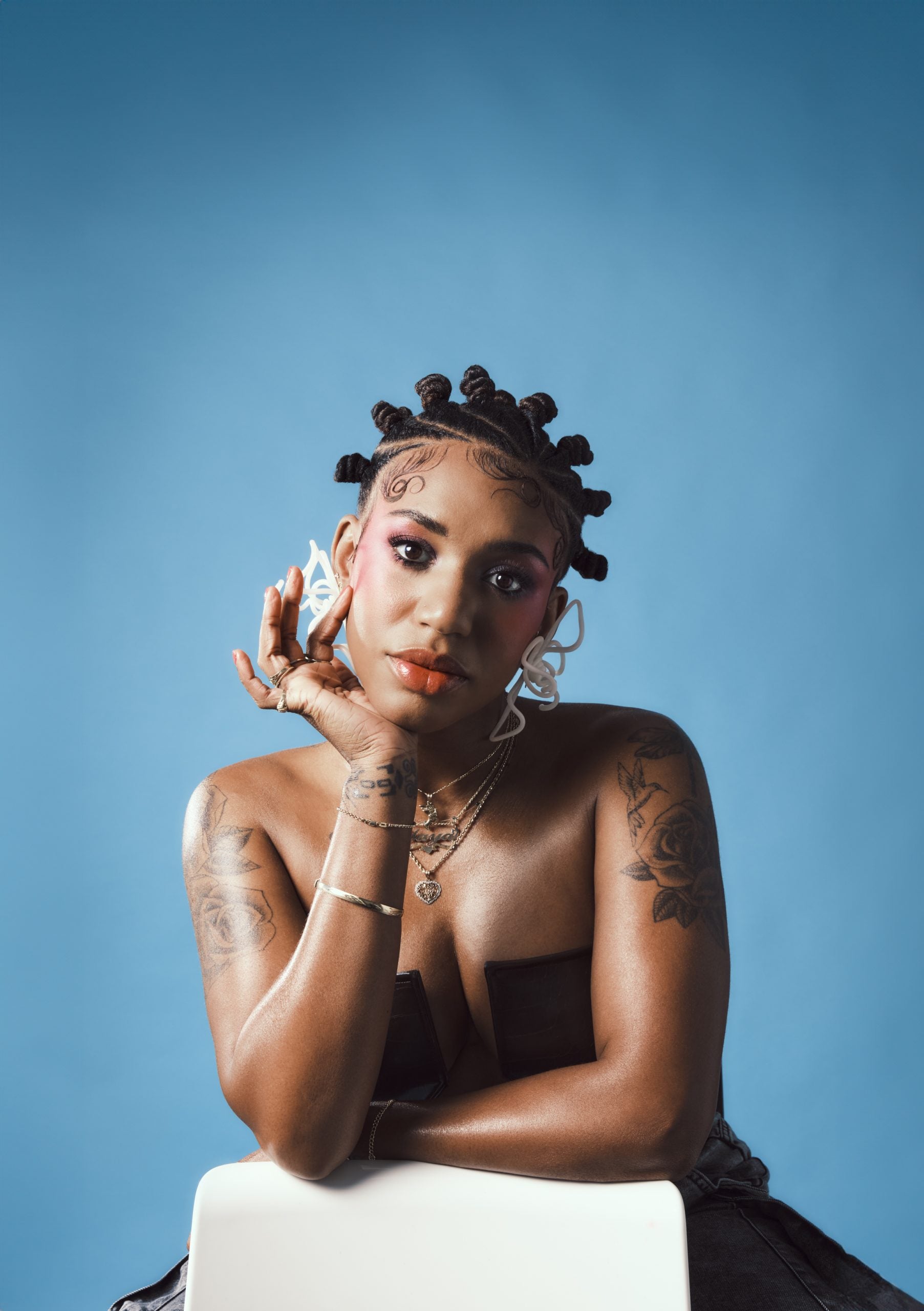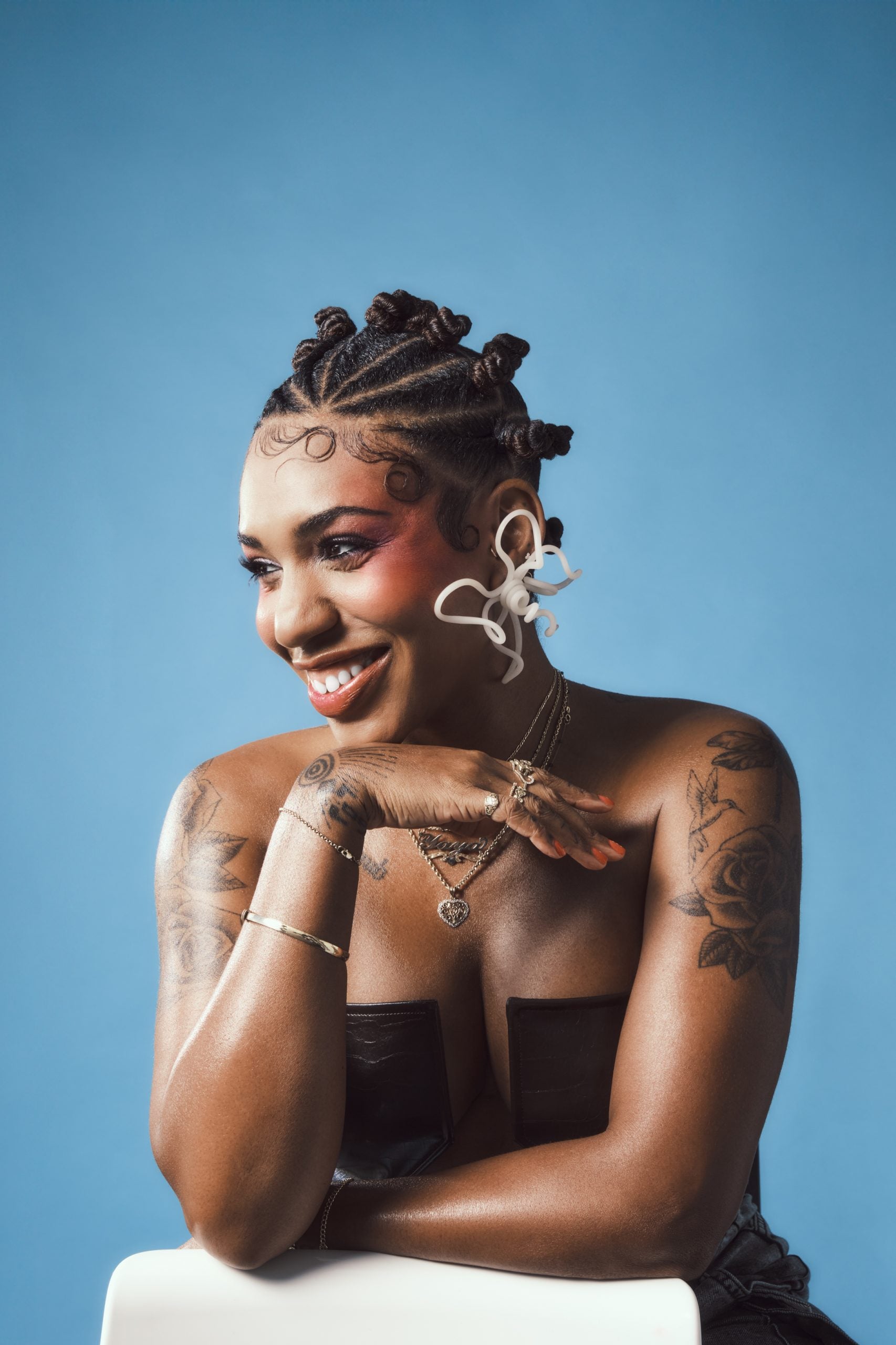
Mary J. Blige is a style savant that Yaya Bey resonated with from an early age. The R&B singer and songwriter shares that when she was a child growing up in New York, she felt that Blige represented what it was to be unequivocally stylish. As an adult, she says the soulful singer subverted conventional beauty ideals amid her creative partnership with the designer and stylist Misa Hylton. She excitedly details how the duo inspired her–and aside from inspiring, Mary was a fixation for her musically, too, due to her parents. “Mary J. Blige image-wise is specifically uplifting for me because again, growing up in New York, I grew up [amid] colorism and anti-Blackness,” Bey shares.
Early in our conversation, she fixates on how being born and raised in Queens, New York, meant finding herself through her style early on. Growing up with colorism and anti-Black sentiments, Bey felt that lighter-skinned women were deemed beautiful due to their straight hair and non-Black ethnic backgrounds. This is what made the award-winning singer, Blige a figure Bey looked up to–her dark skin and majestic style were inspiring factors too.
Separately, the artist says she utilized clothing to protect herself in middle school. “I think my first introduction to style was a defense mechanism,” she says. She often used this means of self-expression to deter her classmates from bullying and teasing her. During one style phase, she says she constantly wore pieces that felt like Donny Hathaway would wear. This was in eighth grade–eventually, she moved on, but she’ll never forget how she felt when dressing up in pieces that reminded her of the beloved singer. By high school, she says her clothing was no longer her armor. By then, she says her attire was more urban-inspired. Since she admires what Misa Hylton was creating with Blige and Lil’ Kim, she felt back then, and even now, she’s still paying homage to all of these women. The artist says this style is most authentically true to her.
Music has always been instrumental to who Yaya Bey is. The Ohio Players, Anita Baker, and Sly and the Family Stone are a few artists she recalls hearing in her home years ago during her childhood. On the opposite end of the spectrum, Lil’ Kim, Foxy Brown, and Jay-Z were also constantly ringing off in her home. Her parents and their musical inclinations, due to their age, kept her up to date with hip hop and R&B acts of the ‘90s and 2000s. By age nine, she was writing songs. Her father is Grand Daddy I.U., a member of the hip hop collective the Juice Crew, so she feels that a life dedicated to crafting her versions of her innermost feelings and thoughts is a natural progression.
Combining her affinity for music and fashion makes Bey peerless in my eyes. And so does the idea that she feels she’s somewhat a hometown hero who had to climb her way to where she sits: in the hearts of her homegrown fanbase. Being in the New York City entertainment industry and scene simultaneously has led to burnout, seeing gentrification firsthand, and being drained in more ways than she can count. But, still, she persists. Bey has created a seat for herself at the proverbial table, where many artists seek a chair.
In addition to persisting, she’s carved out a safe space for herself as a skilled lyricist with a soulful and jazzy musicality that feels expansive. Alongside creating music that speaks to the moments she’s living through, Bey is forever on a truth-telling journey. For her new album, Ten Fold, she grapples with all this by creatively directing her visual assets music videos, and styling everything. Alongside a former mentee and now-friend, Alexis Franklin, the singer is in an aesthetically elevated chapter of her life and career.
Ten Fold is an exploratory and funk-filled kaleidoscopic journey. It’s a reflection of her coping with the most success she’s ever reached last year and also stems from the loss of her father. Unafraid to push herself and experiment, she croons and sings amid bass-heavy, lush, and sometimes upbeat soundscapes on the album. The album is injected with hints of R&B as heard on “chasing the bus,” a lovestruck track, and “slow dancing in the kitchen,” a bouncy and romantic cut. The production, handled by Corey Fonville of the jazz group Butcher Brown, Karriem Riggins, Jay Daniel, Exaktly, and Boston Chery, is cohesive and exploratory, complementing Bey’s poetic ruminations and earnest lyrics.
When I asked if this was her most honest project, Yaya immediately said no. But she offers a transcendent answer, declaring that this album is the most accurate depiction of the lived-in experiences she had dealt with last year. “It might be my most spontaneous album, but maybe that’s the most honest. I think [in] every album I’m telling the truth of the moment,” she adds.
We caught up with Yaya Bey to discuss her newest album, Ten Fold, what it was like to express herself through style as a kid in Queens, and more.

Do you have any core fashion memories?
I think that I sort of had a style that people were like, “What the fuck?” I remember in eighth grade I used to dress like Donny Hathaway very intentionally, like Donny Hathaway with the cab hats and the cardigans and s***, and people would be like, “Girl, what is your reference?” But I felt really cool in those moments.
There were different eras in being a kid in New York before the Soho Kid era. And I’m only speaking from my generation because there’s Gen X, which my older cousin, who I guess was my first introduction to style outside of streetwear, went to FIT. She was like, I guess what all the girls are now, the fashion girlies in New York. She was like that before all the fashion girlies were transplants.
She was that girl. And so she was my first introduction to, yeah, fashion outside of streetwear. And I remember being influenced by her in middle school when it was the kids in the hood, we weren’t ready to do that yet. And so she used to give me clothes that she didn’t want anymore, and I would wear it to school. And I used to think it was so cool and people would be like, “What is this?” And it’d be designer shit too.
Can you talk to me about the Soho era you experienced?
Towards the end of high school, senior year, and freshman year of college, then there was the Soho Kid era and there were all these kids from the hood in the boroughs that were in Soho. And then at that point, or in downtown, we were on some different shit. And then I felt like it was my time because I was kind of like, I guess in eccentric kid in the hood or what was perceived as eccentric because I had all these different influences that weren’t necessarily like streetwear culture. I think towards the end of high school, once the shit that I was doing was in style, and then I felt validated in a certain way because it was like, yeah, this is the shit I’m on
I want to go back to when you were younger, and I imagine that music has just been something that’s been a big deal in your life since you were a child. What music were you feeling energized by in the house as a kid?
We were listening to all kind of things. Well, my dad [was] also a musician and a hip hop producer, so he sampled a lot of old records. I was listening to a lot of old [music] like Ohio Players and Donny Hathaway, Alicia Myers, Phyllis Hyman, Anita Baker, Sly and The Family Stone, a lot of that. But then also my parents were young. My parents were younger than most people, so they were listening to the things that were on the radio at the same time that I was.
They hadn’t aged out of my music taste. So I listened to a lot of Mary J. Blige, a lot of that. Jay-Z and the whole Roc A Fella era was very big in my household: State Property. That was very big. The Lox was very big in my house. Jadakiss, specifically, Styles P. What else was big in my house? Again, Mary J. Blige, Lil’ Kim and Foxy Brown. I was very into Kelis. I don’t know that my parents were, but I was very into Kelis, [I’m] still very into Kelis.
What was it about Kelis and her music that resonated with you?
I didn’t have a rock era, I had never seen anyone express angst in that way because [in] R&B and hip hop, anger and rage are present in the music, but it doesn’t get expressed in that way. And Caught Out There, I mean, she’s walking down the street screaming, “I hate you so much right now.” It was like, I’d never seen no s*** like that. I’d also never seen a Black girl with pink hair, green hair, not at that time. She really is the blueprint for a lot.
Earlier you brought up Misa Hylton. She’s one of our icons in terms of image-making and costume designing on top of being a stylist. Does any of the work that she’s done influence you?
I think the work that she did with Mary specifically is iconic and well, Mary J. Blige image-wise is someone that is specifically uplifting for me because again, growing up in New York, I grew up in, well, how do I explain what I’m trying to say? Colorism and anti-Blackness as it pertains to women and beauty standards show up a little differently than it does in a lot of other places.
Being a Black girl in New York, especially the time that I grew up in, it was like a lot of times it’s proximity to the Spanish girls. Those were the girls that were beautiful or very light-skinned girls with straight hair. And there’s specific messaging that you almost don’t realize that colorism is because when I moved outside of New York, it was the first time for real that I had heard people going, light-skinned, dark-skinned, light-skinned, dark-skinned. In New York, it’s present, but it’s present like texturism and it’s present like featurism and it’s present like exotifying things that have proximity to Blackness but aren’t Black.
We had Mary J. Blige in [a] time where New York is still the mecca of hip hop. She’s the queen of R&B and hip hop. She held down this space where she was a fashion icon. She put the hood onto Fendi, just an icon, and Misa [did] a lot of that for her.
I feel like you’re saying that though Misa Hylton was the reason that everything looked aesthetically pleasing, Mary is still this larger-than-life figure who was able to bring all of that to the forefront, not just for R&B but also for being on hooks of songs that blew up. It’s just like, it’s not just about her voice; it’s also her image that allowed her to transcend.
I feel like she did it in a time when women who look like her were not the preference, and that’s loaded because it’s not even just about how she looks, but also body language and how classism exists in that, especially when we’re talking about style and fashion.
There’s a difference in the body language of girls who grew up rougher. Where if we’re going to talk about masculinity, it’s in our body language. It’s in how we carry ourselves, that there’s a room full of Black girls. I feel very seen by Mary J. Blige and there’s pride in that.
When did you first start creating music?
I was nine when I started writing songs. I think always was like this is something that I want to do. I mean, my dad was a musician, so I think I kind of just always assumed that I would do the same thing. So I can’t necessarily pinpoint when I was like, yeah, this is what I’m going to do seriously. But I know that I started writing songs at nine. I grew up in a house with a musician. I grew up in the house with someone who could guide me through songwriting specifically. But, I didn’t necessarily have voice lessons or something like that.

What can you tell me about the musical eras you’ve experienced?
From album to album, they shifted drastically. I think at first I was just trying to prove to myself that I could do it because I always thought that I was going to write songs for other people. And so then I started making music for myself, I guess, what some would consider pretty late ’cause I was working towards writing for other people.
Then from there, so the first few projects were just me trying to do that. And then I was making music with someone that I was tailoring myself to their sound. And so then I had to try to get closer to a sound that’s more authentic for myself. And I guess there were some points, I guess, where I was wondering how I fit into the landscape. New York has changed a lot. There [were] so many musicians that were on the scene, they’re gone, they’ve gone back to the cities they were from, or they don’t make music anymore, or they’ve blown up and they’re traveling musicians. The people rotate in and out.
I think [in] 2020 when I made an album called Madison Tapes, that was my first attempt at really trying to put out something that sounds like me. And I think it was a good first attempt, but we were in the pandemic, and I didn’t necessarily come up with a lot of support from my peers, but I think, I mean, I have friends that are my friends that are also musicians or creatives in some capacity that are spread [throughout] the country. But I didn’t grow up or I didn’t come up with a lot of support from people that I’m, I guess, in community with. And I kind of had to do it, no co-signs, no help, which is, that is what that is. And I used to feel insecure about it, but now [I’m not].
What’s different about this current era in terms of your musicality?
[With my] last album, I was really struggling. I was struggling financially, [and] emotionally. I think I was still looking for some sort of seat at the table in these spaces that I don’t necessarily fit. I think I had to learn that I don’t even really fit in these spaces. And there’s nothing wrong with these spaces. I think at some points I was bitter.
I think where I am now with this album and things that I’m working on for the future, I think I’m in a more content place just because there’s bigger shit in the world to be worried about than the hoopla of it all. And the hoopla, I mean, I guess what I mean by that is even to bring it back to style, style exists whether you’re at the fancy table or not, and art exists whether you’re at the fancy table or not. And we’re all kind of trained to be trying to strive and succeed at our jobs or the things that we’re doing, and then the reward is this or that. But I think I’ve kind of found my way back to I just want to make my shit and go. And I used to also, I think, want to be perceived as stylish.
I think all your projects are honest and intimate, but I just want to know from your perspective, do you think Ten Fold is your most honest project?
No. I think I have this thing that I say to myself, how many times can you tell the truth until it’s true? And I think that that’s just true for everybody, that we end up telling our own stories a million different times until we get to the truth of it all. Because we lie to ourselves intentionally and unintentionally, and we protect ourselves or sometimes we’re just not perceiving the thing in the accurate way because it requires growth or requires wisdom. This is the only project that I’ve made that wasn’t thematic.
Usually, I approach [album-making] like, this is the theme [and so on]. But my dad died last year and at the same time that he died, I was also, I guess, experiencing the most success from my music I’ve ever experienced. And so I was always on the road. [In] 2023, I was hardly ever home. And I wrote these songs just as the themes popped up instead of approaching it meticulously.